Nerine Dorman's Blog, page 14
August 23, 2022
Under the Mountain by Maurice Gee
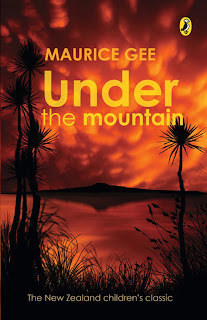
This is a story about a set of twins, Rachel and Theo, who go stay with relatives in Auckland during their summer holiday. What is supposed to be an idyllic time involving fun in the sun instead turns into a terrifying quest when the twins discover the ominous and seriously creepy Wilberforces who live across the lake. And then, in turn, are contacted by the mysterious Mr Jones, who reveals a galaxy-spanning conflict in which the twins' special relationship makes them central to defeating a great evil.
So, this takes the usual 'chosen one' trope and splits the role equally between brother and sister, which is a nice touch. Rachel and Theo share a special bond, and I enjoyed their interactions with each other. Since this is an older book, stylistically it's quite different from the youth literature I'm accustomed to reading these days; it's written in a loose, third-person omniscient viewpoint, and the author shifts between the two viewpoints of the children fluidly. This wasn't as jarring as I'd ordinarily find it, because in terms of the world building, it's made pretty clear that the kids share a far deeper bond than others, in addition to the fact that they also learn to communicate telepathically.
Things get rather fraught in the story, and Gee does not shy away from awful things that happen, and the stakes are made quite clear (and they're high). His monstrous 'slugs' are as terrifying in the book as they were in the miniseries. I know that there was a recent remake (2009) starring Sam Neill, but I've not heard anything positive about the production, so I've not followed up on it. What I will say is that Gee's writing hit the mark for me – he doesn't dumb down his prose; his young protagonists talk in a way that feels like their dialogue has a ring of authenticity; and the kids quickly find themselves over their heads while facing a cosmic evil that smells strongly of Lovecraft. Gee's descriptions are vivid, and you really gain a sense of place, even when faced with the unreal.
In the spirit of reminding the rest of the world that this book exists (first published in 1979), do consider picking it up if you'd like to get a taste of a middle grade fantasy adventure that doesn't coddle its readers.
August 22, 2022
Firefly: Big Damn Hero Firefly, Book 1 by James Lovegrove
Firefly was one of those series on telly that I watched during the dawn of time, and I can't even really remember when and where, except that I enjoyed it for its rather unusual concept of mixing wild west with space opera. Naturally, I was sad that they discontinued the series, and I felt that the feature-length film that was intended to tie up the loose ends didn't quite work for me. So, I'm quite happy to see that there are a bunch of Firefly audiobooks available via Audible, and I'll be working my way through them as I get on.
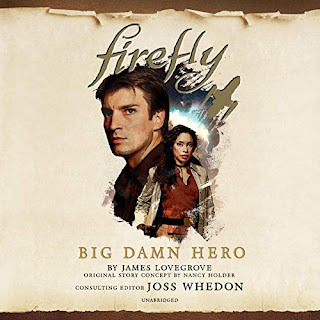
Big Damn Hero by James Lovegrove, read by James Anderson Foster, brings us back to our beloved friends, Captain Mal, Inara, Zoë, Hoban, Kaylee, River, Jayne, Simon, and Shepherd Book, as they take on a fragile and rather volatile cargo that no one else will, 'cos that's how they roll. And, if you labour under the impression that their trip will go smoothly, think again. These things never quite turn out the way our brave heroes expect.
With Mal kidnapped by his erstwhile comrades-in-arms and put on trial for apparent crimes against the Browncoats, and his crew are sent running from pillar to post to a) find out what the heck happened to Mal, and b) figure out how in all the heck they're going to deal with an explosive cargo that could blow them into kingdom come if they're not careful. The clock is ticking...
So this was very much an 'edge of your seat' kinda ride, which I enjoyed. The pacing is fast, and it has all the expected feel I recall enjoying while watching Firefly on telly. I had a few quibbles, like the old 'punching someone's lights out to knock them out' routine which has become such a staple in most pulpy writing. Okay, so this pretty much is guaranteed to set my teeth on edge. Yes, I know it's SF. It's not real. But if you knock someone on the head hard enough for them to pass out longer than for a few seconds, they kinda need to get to the ER ASAP. Blunt force trauma and all.
What I did love was seeing some of Mal's prehistory in flashbacks – this gave his character far more depth than I'd expected. As far as farmboys-turned-intergalactic heroes, he's more Han Solo than Luke Skywalker – a very loveable rogue, but a rogue nonetheless.
Then, I have to offer Mal kudos for having the strongest bladder in the galaxy. He was tied up, needed to take a slash, couldn't, and somehow held it in despite a long, bumpy ride in a shuttle with a little roughing up along the way. That should be his super power. If you hold in your pee for longer than 10 hours... you start running into problems. Just saying... Mal has an iron bladder. Maybe even titanium.
I also enjoyed seeing Zoë doing her tough-as-nails thing, stepping up to the plate with Mal otherwise occupied. And Shepherd Book also shows a surprisingly clandestine side you don't ordinarily see. There's way more to the man than his spirituality, is all I'm saying.
Firefly, as I recall, has always been a vehicle for biting social commentary, and Big Damn Hero is no exception. I guess because it's been such a long time since I watched the show, that it took me a while to grow accustomed to the "a western, but in space" theme, but it's fun and pulpy once you, ahem, swing back into the saddle. I'll recommend this one for the fans, since having a background understanding of the characters' interactions will most certainly enrich the audiobook experience. James Anderson Foster has a lovely voice, and he was a real treat to listen to. Come get your Firefly fix.
August 18, 2022
Children (The Ten Worlds #1) by Bjørn Larssen
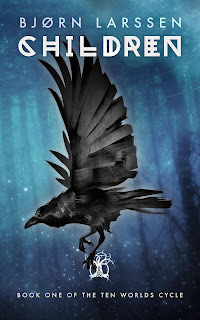
The story is told from the alternating points of view of the human magic-wielder Maya, exiled from the home of her foster-mother Freya (yes, THE Freya), she's left serving a king whom she doesn't like one bit. For Reasons that are many and varied. Enter Magni, the natural son of the god Thor, who has, ahem, an axe to grind with his father. Because, Reasons. I'm not going to go into the depth and breadth of this sprawling story, but as the Norns will have it, the tricksy, shapeshifting Maya's and soft-hearted Magni's paths do cross, and their individual tales weave fluidly with a retelling of some of the classic Norse myths.
Children is an ambitious read, and for the most Larrsen executes things well. Maya is desperate for freedom, but her desire for this comes at a great cost – one that she's perhaps not quite prepared to pay. Magni's life is anything but easy, and in his naïveté, he jumps from one cringe-worthy situation to another. And perhaps that was one of my main reasons why I wasn't as enamoured with this story as many other readers were – I felt that at times Magni's lack of guile made him fall almost squarely into the TSTL* category. Neither character, in my not-so-humble opinion, did much growing so much suffering one terrible denouement after the other.
The pacing for the novel also felt uneven, to me, at least, and at times confusing. There were moments when the writing became too fast, too unstructured, but then again, YMMV – this is most certainly an ambitious telling, but I'm pretty certain it's also not going to be everyone's cup of tea, as there are scenes of emotional, physical, and substance abuse, in addition to manipulation and oodles of violence. Then again, I wouldn't expect anything less from the Norse pantheon. They can be a tricksy lot who don't particularly care for those they see as being less than them. My thoughts are that this novel could have used a more rigorous structural edit right at the get-go, but on the whole this is still a worthy read. If you're looking for a 'lower-deck' type story featuring minor personages from the old sagas, then this might well be right for you. In this case, I suspect, that the fault for not liking this book as much as others did falls squarely with the reader.
* Too Stupid To Live
August 16, 2022
The Artist Vanishes by Terry Westby-Nunn
When the opportunity came up to read and review The Artist Vanishes by Terry Westby-Nunn, I snatched up the book with both hands. A goodly many years ago I read The Sea of Wise Insects, and while most of the novel's details have grown foggy for me due to the vagaries of time, I recalled that I resonated with Terry's writing style. Not only that, she writes about the Cape Town I know all too well – its quirky denizens who often inhabit liminal spaces.
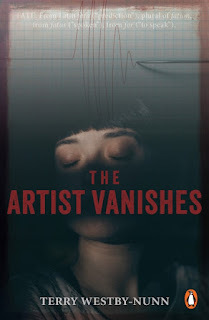
The Artist Vanishes is chock full of thoroughly unlikeable characters doing thoroughly awful things, but the hallmark of a good author is someone who makes you care about these dreadful people despite their questionable antics. And this novel is so cleverly written. Actually, it's two novels, following two loosely interlinked timelines. On one, we follow the story of the quintessential starveling artist Sophie, who occasionally makes ends meet by working in the film industry (hey, I relate to that particular brand of suffering) until she wins a grant for her incredibly controversial art project that catapults her into notoriety. Needless to say, her sudden, meteoric success nearly destroys her as she spirals into coke-fuelled paranoia, surrounded by people who are not good for her. At some point, she's going to need to find her pole star, but doing so puts her in great danger.
Years later, failed filmmaker James washes up in Sophie's old apartment. He's lost it all, including his marriage, and he's looking at the world through the bottom of a whiskey bottle. That is, until he discovers that his ratty home was where Sophie used to stay – the notorious artist who is vanished, and presumed dead. James finds his groove again, investigating Sophie's disappearance, and his fumbling efforts to unpick the mystery serves to show us the other side of the awful people who were Sophie's 'friends'.
At its heart, this is a slowly unfolding tale where we see the world through the eyes of two very troubled, unreliable narrators. I must warn sensitive readers that there is an Awful Thing that happens to a pet, so if this sort of thing bothers you, perhaps don't read this book. Terry's writing, however, is an absolute joy. Armed with a keen perception of people and Cape Town's many (often contrasting) layers, she takes readers on a deep dive, slowly unspooling her secrets. The only thing about her writing that nearly drove me dilly was her one-word dialogue tags that feel like stage directions from a script. These happened often enough that I started gritting my teeth, but I also suspect that it's my pernickety editor side who was so dearly troubled. Normal readers probably won't even notice.
The Artist Vanishes is a cleverly told mystery that underpins why Terry Westby-Nunn remains on my 'grabby fingers' list of South African authors.
August 9, 2022
The Saga of the Volsungs with the Saga of Ragnar Lothbrok by Jackson Crawford
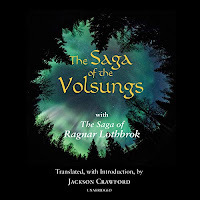 Recently I gave the Poetic Edda, as translated and narrated by Jackson Crawford a spin, and this time it was his translation of The Saga of the Volsungs with the Saga of Ragnar Lothbrok. As always, Crawford's narration is enchanting, and I'm struck by how easy the story was to follow (for the most). This is a short listen, of about four hours, but it packs in much. The Saga of the Volsungs dates back to the 13th century, and relates the ill-starred legend of Sigurd and Brynhild. As is common in much of the Northern sagas, there is much violence, betrayal, cursed treasure, and players who are incapable of slipping their fates, despite being aware of their inevitable grisly demises. I was keen, also, to listen to Ragnar Lothbrok's tale fully, since I've been watching Vikings on and off, though admit to having stalled on the series.
Recently I gave the Poetic Edda, as translated and narrated by Jackson Crawford a spin, and this time it was his translation of The Saga of the Volsungs with the Saga of Ragnar Lothbrok. As always, Crawford's narration is enchanting, and I'm struck by how easy the story was to follow (for the most). This is a short listen, of about four hours, but it packs in much. The Saga of the Volsungs dates back to the 13th century, and relates the ill-starred legend of Sigurd and Brynhild. As is common in much of the Northern sagas, there is much violence, betrayal, cursed treasure, and players who are incapable of slipping their fates, despite being aware of their inevitable grisly demises. I was keen, also, to listen to Ragnar Lothbrok's tale fully, since I've been watching Vikings on and off, though admit to having stalled on the series. Overall, what works for me is Crawford's delivery of the poems – he takes great pains with his research and his pronunciation, which makes hearing this audiobook an absolute treat.
July 31, 2022
Dragon's Code by Gigi McCaffrey
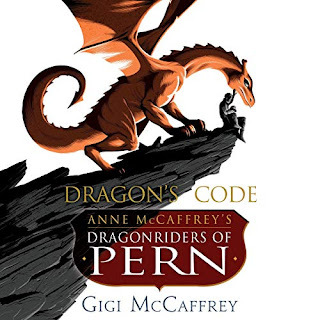
But alas, Anne passed away in 2011, and her children have since stepped up to the plate to add to her body of work. Gigi, Anne's daughter, penned Dragon's Code, which is a sort of 'lower deck' story surrounding the events that occur in Anne's The White Dragon. We follow the doings of Piemur, the 'failed' harper as he's sent around the southern continent to do mapping. What Piemur is a tad bit too dim to understand is that he's really the eyes and ears of the famed Masterharper Robinton, who has placed him in a perfect position to keep an eye on a rogue band of dragonriders known as the "Oldtimers" who had been brought forward in time (yes, the dragons can time travel, in addition to teleport). Piemur uncovers a plot to steal a queen dragon egg, and although he's not pivotal in its return, he does play a part in the events that unfold.
One of the criticisms that is levelled at this work is that it doesn't cover any new ground. Gigi plays it safe by writing the connective tissue that plays out in the background of another work. My other criticism is that the writing itself could have used more rigorous editing – in terms of development and general technical considerations. The dialogue alone was enough to make me weep, with many 'as you know, Bob' type situations, where characters were clearly only talking about certain topics for readers' benefit. Not just that, but there was so much exposition, I wanted to tear out my eyes. I still need to go back to Anne's original writing to see how I feel about it after all the intervening years, but I don't recall her indulging in so. Much. Exposition.
There were instances of voices 'raised several octaves' which made me giggle uncontrollably, because clearly she meant the voices must've raised in volume and not pitch, and this is a common error non-musicians make that the editor *should* have caught.
Gigi also plays rather loose and fast with official canon. In my understanding of Anne's setting, her 'runner beasts' were horses that had been originally imported from Earth by the colonists. Gigi turns them into native, six-legged species with horse-like attributes, which made me want to crawl up the walls. In terms of characterisation, she totally misrepresented Masterharper Robinton. In Anne's works, he's shrewd and observant, but Gigi portrays him as being aloof, authoritarian and bumbling, especially in how he treats Piemur in such a patronising manner. This. Is. Not. Robinton. Nope. Nope. Nope. Also, Journeyman Sebell gets a whole new title when in Anne's books he's clearly a journeyman and not the fancy title Gigi gifts him.
Then Gigi commits one of the cardinal sins: that of writing an entire scene from the viewpoint from a third-person character while deliberately and oh-so-mysteriously not telling us who this person is, despite us having a perfectly good idea of what they're thinking, feeling. Gah! If you're writing a viewpoint character, DON'T DO THIS. This is a rookie move. This should never have flown in a traditionally published book. It's lazy, ham-fisted writing in a vague attempt to build tension. (Kinda like a murderer as viewpoint character in a whodunnit who conveniently doesn't mention that they're the darned bleeding murderer.)
Anyhow, that's my take on the matter, based on years of editing, being edited, and writing book reviews. Yeah, yeah, argument from authority and all that, but I'll stand by my opinion about viewpoint glitches such as the aforementioned because they truly grind my gears.
I'm glad that I listened to the audiobook capably narrated by Ryan Burke rather than read this book. I maintain that audio is a far more forgiving and engaging medium if the text is subpar, with many of the gremlins becoming somewhat less 'visible', so to speak. If anything, Dragon's Code has made me want to revisit Anne's work again, and perhaps even start writing a new fic in the setting, because the DRoP books occupy a special place in my heart. And if you do decide to give Dragon's Code a spin, perhaps if you view it as officially accepted fanfiction rather than canon, it's probably going to be perfectly all right to read (if you can get past the dialogue, characterisation, and viewpoint issues).
While it's perfectly possible to enjoy Dragon's Code without having read any of the other books set on Pern, I do suspect that much of what happens may go over your head. It's a big, sprawling world, with a lot of history, so I suspect Dragon's Code is very much aimed at the hardcore lore enthusiasts. Although those who are serious about lore and characterisation, will most likely be as disappointed as I was in the execution of what could have been a really good story. What I did enjoy was the glimpse into Piemur's past and upbringing before he studied in the Harper Hall. So there was that. Make of it what you will.
July 23, 2022
Mass Effect: Nexus Uprising by Jason M Hough, KC Alexander
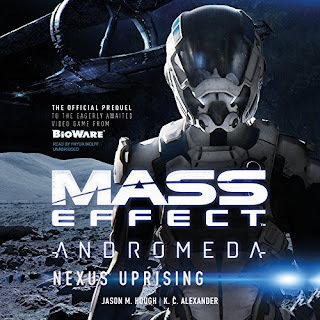
Security Director Sloane Kelly has her hands full when she awakens out of her her cryopod to a critically damaged space station, thousands of light years from help and the home they've left behind. With life support systems failing, hydroponics all but destroyed, and food supplies running low, the survivors are dropped into a race against time to get things back online before the first arks arrive from the Milky Way.
Of course, things are not smooth sailing, and what Nexus Uprising does well is show how all good intentions can go horribly, horribly wrong as factions start working against each other in a desperate bid for survival in a hostile environment. Kelly finds herself in a difficult position, playing middle woman between the decision makers and the security and engineers who are trying to keep it all together. Sometimes the right decisions are not always the easiest, and this is how we discover why Kelly ends up where she does in-game. A hint: she's not all bad, like you might assume the first time you meet her on your play-through. I won't spoil.
As always, if I have to pick favourite, it's the krogans. I really hope we get to see more of them in the future. It's so tempting for me to eventually replay ME:A just so I don't make some of the terrible choices I did in-game the first time around. Especially knowing more of the backstory that I know now. Overall, Uprising is a slow-boil thriller with a devastating conclusion that sets the tone for what our Pathfinder discovers once they arrive. I suspect this story won't be to everyone's taste, but I loved the characterisation, the way that all the characters were portrayed as being morally grey. It's always so tempting to make someone the big bad, which none of them really are.
If you're looking for a space survival SFF story stuffed with intrigue and machinations, this one may well tick the boxes. Perhaps not as fast-paced as some would expect, it nonetheless provides context for events in-game that make this a valuable addition for the lore it offers.
Mass Effect: Nexus Uprising was included in my Audible subscription and is wonderfully narrated by Fryda Wolff, who voices Sara Ryder in Mass Effect: Andromeda and is a well-known voice artist for the gaming industry.
July 17, 2022
Aether Shift by Alex Shepherd
Aether Shift by Alex Shepherd has one of those covers that in absolutely no way has anything to do with the content. At a glance, you might be forgiven in thinking it a SF novel, which it's not. Aether Shift is very much a magic-rich fantasy of an epic kind. Our main character Daen is a rebel whose mistake costs him his freedom – he ends up in a slave market, which can be argued is a fate almost worse than death. But to make matters worse, he is purchased by Duke Kieron who is a representative of everything Daen has been fighting against – a man who has a penchant for collecting magical creatures that he controls with the very magic that he despises.
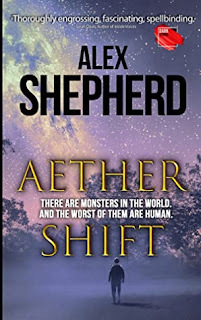
We also meet the shapeshifter Asha, a long-time thrall of Kieron's, who is used to manipulate Daen, who is (obviously) resistant to sharing any intel that might jeopardise his fellow rebels. His cause is not helped by the fact that the king, too, has a rather lethal interest in Daen. Asha does not believe that anyone would want to help her, and she's very much aware that she is a tool in Kieron hands. Daen is a high-value pawn, whether he likes it or not, and it's her job to crack him. She just doesn't expect that she's going to warm to his advances of friendship.
I wasn't quite sure where Shepherd was going with this story, whether it would be a desperate bid for freedom resulting in a quest – but it was an engaging read nonetheless, with plenty of intrigue and fascinating world building, in addition to a well-realised magic system – always good to see. I did feel, however, that this novel could have used a more stringent bit of copy editing. For instance, 'drug' is definitely not the past participle of 'drag', and the occasional modern idiomatic expression crept in that felt out of place with what feels like a baroque-era type setting. And there were the occasional dropped words, grammar gremlins or typos, but not enough to upset me. Overall, Shepherd tells a solid, engaging story that I related to, and after I got to know the characters, I cared about them pretty quickly.
This is a story about freedom, about doing the right thing, even if it's dangerous. This is also a story about about trust – and friendship despite having all the odds stacked against success. It's clearly a first book in a series, and if you're in the mood for a story about slaves fighting for freedom (a noble cause, if ever there was one) then this one will push the right buttons.
June 30, 2022
Junji Ito's Cat Diary
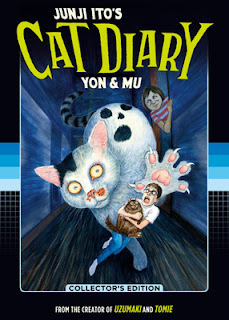
For all his reputation for grim and exceptionally strange horror, what Ito does with this slim volume is tell us about his cats, Yon and Mu, and the (mis)adventures they experience. He fictionalises his life, casting himself as J-kun, and his then-fiancée A-ko in their own manga. The joy comes in with how he portrays life with these felines – darkly humorous takes that flirt with then subvert all the expected horror tropes he's known for. But with cats. And no one dies a grisly death, swallowed by a mountain or menaced by giant floating heads. Let's admit it: cats can be kinda creepy in their own way.
And I laughed. A lot. The little tales are short, so if you need to decompress after a torrid work day, then you'll most certainly gain a few much-needed chuckles that won't tax your concentration. I felt that this was almost a shorter, sweeter answer to Paul Gallico's The Silent Miaow (at least in my mind a vaguely comparable work). Interspersed between the strips we also have short interviews with Ito that offer small glimpses into his world. And he really does seem like a really lovely person (well, duh, he loves cats). Even if he draws his wife with no pupils in her eyes (which apparently made her rather vexed).
June 18, 2022
The Whistling by Rebecca Netley
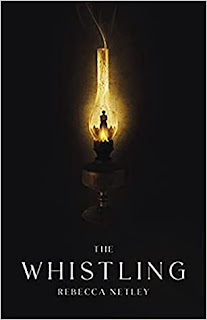
We follow the doings of Elspeth Swansome, who accepts a post in the fictional Scottish isle of Skelthsea. Her charge is the rather troubled little girl Mary, whose brother William (whom no one, apparently, liked much) died. Her parents are dead, too, and since her brother's passing, she has not spoken a word.
Almost immediately, Elspeth runs afoul of some of the locals, and although she does not at first believe in the supernatural, the spooky phenomena eventually bring her around. She soon realises that nothing is what it seems, and with little else to do but care for a child she comes to love as though she were her own, Elspeth must also untangle the mysterious and tragic past that enshrouds the house and its inhabitants.
I'm not going to go into too much detail for fear of spoilers, but I am going to critique the things that bugged me. Netley's writing is what I would term adequate, so she carries the story well, but the pacing lags considerably. She spends much time creating mood and atmosphere, for which I must give credit where it's due. But then the story gets bogged down in piles of red herrings. When I started reading, I called what the big bad was (possibly based on the fact that I've read and watched a pile of horror in my time) and guess what? I was right.
While the use of horror tropes to build tension isn't necessarily bad, it's when they're the ones you can see coming from a mile away, including jump scares (which somehow don't quite work in fiction, let's be honest) I didn't find any of the devices used to build tension or terror at all terrifying or effective. I'd hazard to say that this book felt like an amalgamation of every Gothic horror or mystery already in existence, that has been cherry picked for suitable narrative elements. No fresh ground is covered, in other words.
I'd say that if you are new to the horror or Gothic genres, you might find this work fresh and suitably chilling, but alas, I admit my jaded palate has already tasted many similar and better executed flavours over the years. At times I felt that this book would have been better served as a movie than the written word, where the mood and atmosphere could truly come into its own.



